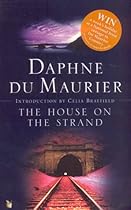 I thought I'd like Daphne du Maurier's The House on the Strand
I thought I'd like Daphne du Maurier's The House on the StrandHe resents his wife's overbearing attitude. Can you imagine, she'd like to know his plans for the future! She dares to want to know what continent they'll be living on, or whether he plans to get a job. Every month or so she nags him about this, because she is so annoying. The kids keep expecting to, well, actually they don't expect much, and are happy and grateful for whatever comes their way, but still, having them around crowds his style.
The enjoyable part for me were the jaunts into the past, but those are surrounded by the idiocy of the men doing the jumps. See, only your mind goes into the past, so you wander about the present-day land, seeing what happened there hundreds of years ago, when people were much more interesting. Of course, when modern things like trains zip through the land, unfortunate accidents occur. It's not hard to think of a few safeguards to keep things safe, but that would require thought, which the protagonist avoids at all costs, preferring whinging and sulking as full-time occupations. The call of the drug that brings on the past is clearly a metaphor for addiction, where the next fix becomes the only important thing, but I get enough of that from melodramatic YA books; seeing it in a supposedly worldly adult is dull. I kept rooting for his wife to take the kids and leave.
I think my main problem with this book is that I approached it from the wrong genre. In science fiction (time travel), the protagonist is usually someone worthwhile, or at least trying to be. Also, intelligent. The reader is expected to root for them. This book is literary fiction, where the protagonist is often encouraged to be vile. I forgot that, so by the time I got my footing I had identified with the narrator too much, and couldn't distance myself from my contempt enough to enjoy the book. Much the same thing happened to me when I saw the movie Fargo, which had been described to me as a light romantic comedy. Or the movie The Sixth Sense, which I rented on a recommendation for a good date-night movie. C-
1 comment:
The only book I ever read by Daphne du Maurier was Rebecca, and it was a long time ago, but I remember liking it. This one doesn't sound as good. Maybe I don't remember not liking Rebecca so I never read more of du Maurier, but The House on the Strand won't be on by immediate TBR list.
Thanks for the revealing review.
Post a Comment